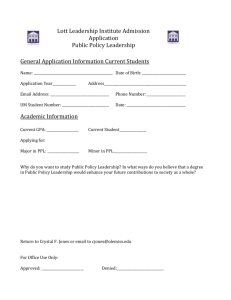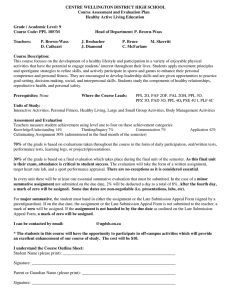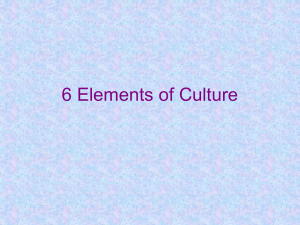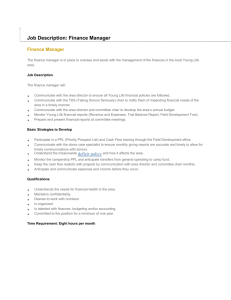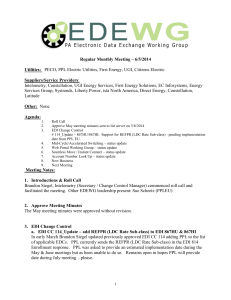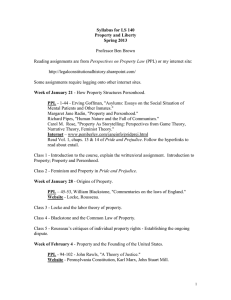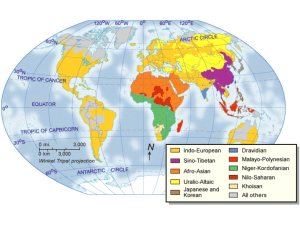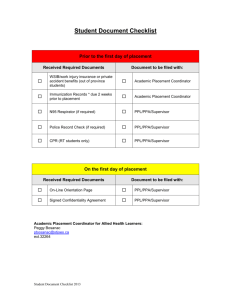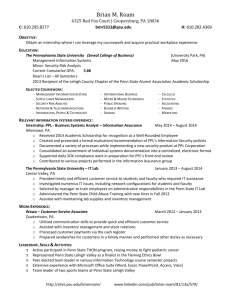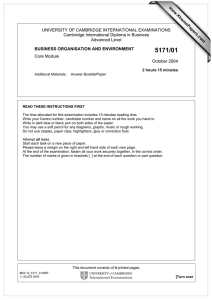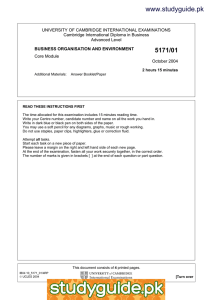Name: Student number: Listening Skills Mid
advertisement
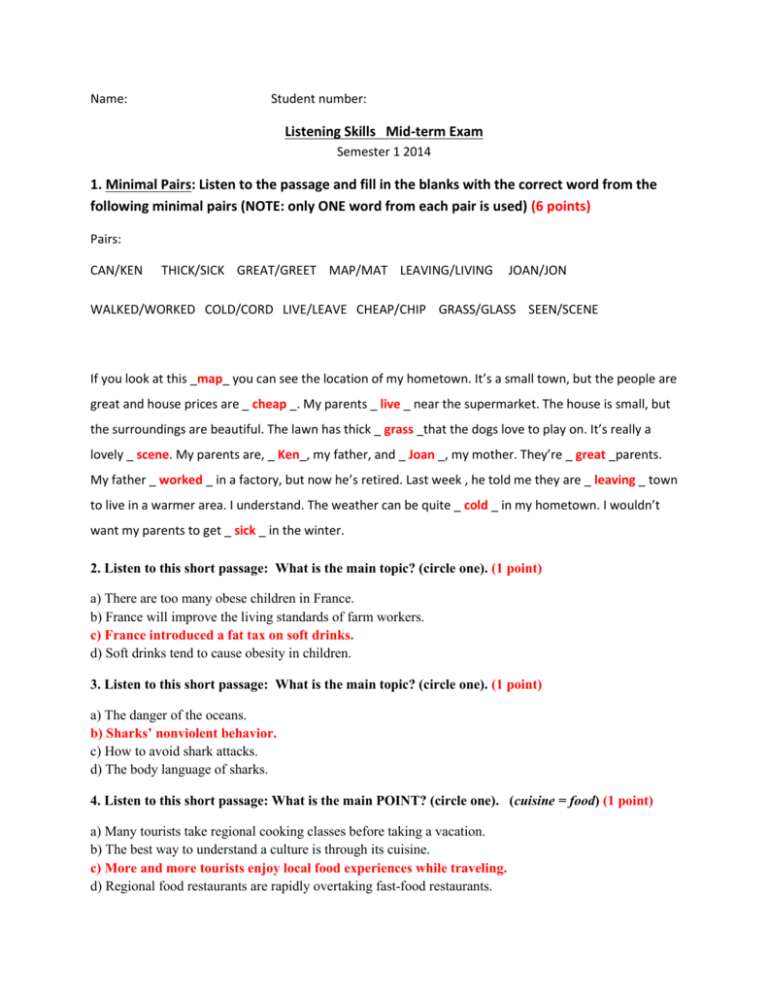
Name: Student number: Listening Skills Mid-term Exam Semester 1 2014 1. Minimal Pairs: Listen to the passage and fill in the blanks with the correct word from the following minimal pairs (NOTE: only ONE word from each pair is used) (6 points) Pairs: CAN/KEN THICK/SICK GREAT/GREET MAP/MAT LEAVING/LIVING JOAN/JON WALKED/WORKED COLD/CORD LIVE/LEAVE CHEAP/CHIP GRASS/GLASS SEEN/SCENE If you look at this _map_ you can see the location of my hometown. It’s a small town, but the people are great and house prices are _ cheap _. My parents _ live _ near the supermarket. The house is small, but the surroundings are beautiful. The lawn has thick _ grass _that the dogs love to play on. It’s really a lovely _ scene. My parents are, _ Ken_, my father, and _ Joan _, my mother. They’re _ great _parents. My father _ worked _ in a factory, but now he’s retired. Last week , he told me they are _ leaving _ town to live in a warmer area. I understand. The weather can be quite _ cold _ in my hometown. I wouldn’t want my parents to get _ sick _ in the winter. 2. Listen to this short passage: What is the main topic? (circle one). (1 point) a) There are too many obese children in France. b) France will improve the living standards of farm workers. c) France introduced a fat tax on soft drinks. d) Soft drinks tend to cause obesity in children. 3. Listen to this short passage: What is the main topic? (circle one). (1 point) a) The danger of the oceans. b) Sharks’ nonviolent behavior. c) How to avoid shark attacks. d) The body language of sharks. 4. Listen to this short passage: What is the main POINT? (circle one). (cuisine = food) (1 point) a) Many tourists take regional cooking classes before taking a vacation. b) The best way to understand a culture is through its cuisine. c) More and more tourists enjoy local food experiences while traveling. d) Regional food restaurants are rapidly overtaking fast-food restaurants. 5. Listen for details: Multiple choice: Listen to the news story and circle the correct answer: Word guide: (6 points) gardener – a person who works in a garden villa – a large and expensive home purchaser – a buyer magnate – very important person tycoon – a powerful business person mansion – a very large house I. What is the new record for the world’s most expensive home? a) $75,000,000 c) $750,000 b) $750,000,000,000 d) $750,000,000 II. What was the price of the previously most expensive home? a) $235,000,000 c) $35,000,000 b) $325,000,000 d) $235,000,000,000 III. When was this mansion built? a) 1992 b) 1920 b) 1902 c) 1892 IV. How many full-time gardeners do the gardens require at this house? a) 15 b) 50 c) 150 d) 55 V. How many trees does the mansion have? a) 12,000 b) 120,000 c) 1,200 d) 120 VI. What is the value of India’s richest man’s house? a) $2,000,000 c) $20,000,000,000 b) $2,000,000,000 c0 $20,000,000 6. Listening for details: Watch this clip from the documentary “Supersize Me” and answer the questions. (6 points) I. How many Americans are now overweight or obese? - Nearly __100,000,000 Americans are now overweight or obese. II. How many deaths per year are related to obesity? More than 400,000 (400,000 was enough for full points) III. In what year did two girls sue McDonald’s? 2002 IV. How many restaurants (“joints”) does McDonald’s have worldwide? More than 30,000 (30,000 was enough for full points) V. How many people eat at McDonald’s worldwide each day? 46,000,000 VI. What percentage (%) of the U.S. fast food market does McDonald’s represent? 43% 7. Lecture language: listen to the language clips. Each question has 2 parts (a + b). a asks you to answer a question based on the clip. b asks you to write the LANGUAGE that indicates the answer to a. EXAMPLE: Speaker: A popular hobby now is web surfing. What does web surfing mean? It means to search for things and read information on the Internet. a) What does ‘web surfing’ mean? - It means to search for things and read information on the Internet. b) What language indicates this? - What does ____ mean? It means to… (12 points) I. a) What is the topic of this lecture? - Diet and health b) What language indicates this? - Our main topic today is… II. a) What are the two main points of this lecture? - 1. Where and how English is used. 2. Different reactions to the spread of English. b) What language indicates this? First, we’ll look at ___, and then we’ll discuss ___ III. a) What is the next point in this lecture? - What is happening in the workplace. b) What language indicates this? - Let’s now move on to talk about… IV. a) What does “down time” mean? - Free time or relaxation time. b) What language indicates this? - What I mean by …is … V. a) What is the important information here - The trend away from newspapers to the Internet is happening right in front of us. b) What language indicates this? - I want to stress that… VI. a) What is the next point in the lecture? - Why people want to use slang. b) What language indicates this? - So let’s move on to… 8. Lecture: PART A: Listen to the lecture. Use the next two pages to take notes. Use outline format, symbols and abbreviations, and indicate the important information. (10 points) Lecture Topic: ___Media images (television)____ > U.S. public watches ~30 hrs/week TV > Ppl. take TV images for granted - not aware of patterns we see (stereotypes) -stereotypes influence public thinking about real ppl. & real world > ppl . confuse reality w/ TV >Media literacy = understanding power of media Understanding need for media lit. 1. TV characters diff. from real ppl. > Gender - On TV men > women women 38% TV roles (but women = 50% of US popn.) > Econ. class - 50% TV charct. = wealthy real % of wealthy ppl = much lower > Jobs - 1/3 TV charct. = professional/mgmnt. jobs e.g. doctor, lawyer - in US only 11% ppl. = prof. jobs 2. TV stereotypes > reason: program directors need easy recognizable charact. > Men - 2 stereotypes: 1 – men do more things than women e.g. powerful job, play sports - men more role variety than women 2 – men can solve prob. w/o help > Women - 1 main stereotype; is woman single, needs a love relationship to be successful - Prob. = even if woman is smart or professional, focus = attractiveness + ability to find man Reasons for stereotypes 1. TV = product TV shows develop from marketing POV. - viewers want easy to und. charact. 2. Ppl. don’t want to see real world on TV - often want fantasy - Danger: if TV only fantasy programs – ppl. think fantasy = real PART B: Use your lecture notes to answer the following questions: (7 points) I. What are the three ways that the characters on TV are different from people in the real world? 1. Gender (more men than women; reality, women > 50% of the population) 2. Economic class (approx.. 50% of characters on TV are wealthy) 3. Occupation (1/3 TV characters have professional jobs; reality, approx. 11%) II. What are some of the television stereotypes of men? Describe them. 1. Men can do more things than women (i.e., play sports, travel, have powerful jobs) 2. Men can solve problems without people’s help. III. What is one television stereotype of women? Describe it. No matter what, the female characters must find a man; that is their purpose. The female characters are often young and attractive to make finding a man easier. IV. What are some concerns about the way TV presents the world and people? 1. People don’t want to see the real world; they want fantasy. 2. People can confuse fantasy with the real world. Total /50 - END. Now, relax-
